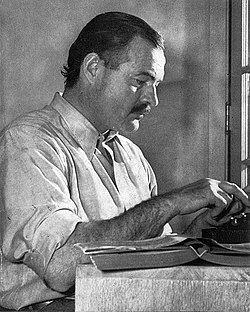Ernest Hemingway Quote
No. The two kinds of fools we have in Russia, karkov grinned and began. First there is the winter fool. The winter fool comes to the door of your house and he knocks loudly. You go to the door and you see him there and you have never seen him before. He is an impressive sight. He is a very big man and he has on high boots and a fur coat and a fur hat and he is all covered with snow. First he stamps his boots and snow falls from them. Then he takes off his fur coat and shakes it and more snow falls from them, Then he takes off his fur hat and knocks it against the door. More snow falls from his fur hat. Then he stamps his boots again and advances into the room. Then you look at him and you see he is a fool. That is the winter fool.Now in the summer you see a fool going down the street and he is waving his arms and jerking his head from side to side and everybody from two hundred yards away can tell he is a fool. that is a summer fool. This economist is a winter fool.
No. The two kinds of fools we have in Russia, karkov grinned and began. First there is the winter fool. The winter fool comes to the door of your house and he knocks loudly. You go to the door and you see him there and you have never seen him before. He is an impressive sight. He is a very big man and he has on high boots and a fur coat and a fur hat and he is all covered with snow. First he stamps his boots and snow falls from them. Then he takes off his fur coat and shakes it and more snow falls from them, Then he takes off his fur hat and knocks it against the door. More snow falls from his fur hat. Then he stamps his boots again and advances into the room. Then you look at him and you see he is a fool. That is the winter fool.Now in the summer you see a fool going down the street and he is waving his arms and jerking his head from side to side and everybody from two hundred yards away can tell he is a fool. that is a summer fool. This economist is a winter fool.
Related Quotes
About Ernest Hemingway
Hemingway was raised in Oak Park, Illinois, a suburb of Chicago. After high school, he spent six months as a reporter for The Kansas City Star before enlisting in the Red Cross. He served as an ambulance driver on the Italian Front in World War I and was seriously wounded by shrapnel in 1918. In 1921, Hemingway moved to Paris, where he worked as a foreign correspondent for the Toronto Star and was influenced by the modernist writers and artists of the "Lost Generation" expatriate community. His debut novel, The Sun Also Rises, was published in 1926. In 1928, Hemingway returned to the U.S., where he settled in Key West, Florida. His experiences during the war supplied material for his 1929 novel A Farewell to Arms.
In 1937, Hemingway went to Spain to cover the Spanish Civil War, which formed the basis for his 1940 novel For Whom the Bell Tolls, written in Havana, Cuba. During World War II, Hemingway was present with Allied troops as a journalist at the Normandy landings and the liberation of Paris. In 1952, his novel The Old Man and the Sea was published to considerable acclaim, and won the Pulitzer Prize for Fiction. On a 1954 trip to Africa, Hemingway was seriously injured in two successive plane crashes, leaving him in pain and ill health for much of the rest of his life. He committed suicide at his house in Ketchum, Idaho, in 1961.
